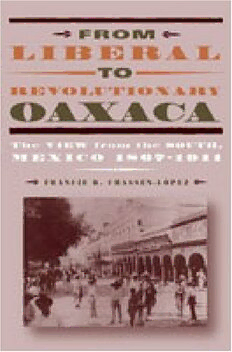
From Liberal to Revolutionary Oaxaca: The View from the South, Mexico 1867-1911 PDF
625 Pages·2004·4.748 MB·English
Most books are stored in the elastic cloud where traffic is expensive. For this reason, we have a limit on daily download.
Preview From Liberal to Revolutionary Oaxaca: The View from the South, Mexico 1867-1911
Description:
From Liberal to Revolutionary Oaxaca aims at finally setting Mexican history free of stereotypes about the southern state of Oaxaca, long portrayed as a traditional and backward society resistant to the forces of modernization and marginal to the Revolution. Chassen-L?pez challenges this view of Oaxaca as a negative mirror image of modern Mexico, presenting in its place a much more complex reality. Her analysis of the confrontations between Mexican liberals’ modernizing projects and Oaxacan society, especially indigenous communal villages, reveals not only conflicts but also growing linkages and dependencies. She portrays them as engaging with and transforming each other in an ongoing process of contestation, negotiation, and compromise. The book is organized in three parts. The first examines Oaxaca's infrastructure and economy, addressing whether its native sons, Presidents Benito Ju?rez and Porfirio D?az, neglected their own state in the drive toward Mexico's modernization. The second part looks at the society, studying the dynamic interplay of class, ethnicity, and gender and critically examining claims that the indigenous people of Oaxaca acted as an obstacle to progress. The final part connects the economic and social transformations in Oaxaca with the state’s changing political culture and power relationships and reinserts Oaxaca into the larger dynamics of the Mexican Revolution. By linking developments at the local, state, and national levels throughout and making frequent comparisons with developments in other states, Chassen-L?pez compels a reassessment not only of Oaxacan history but of Mexican history in general during this period.
See more
The list of books you might like
Most books are stored in the elastic cloud where traffic is expensive. For this reason, we have a limit on daily download.
